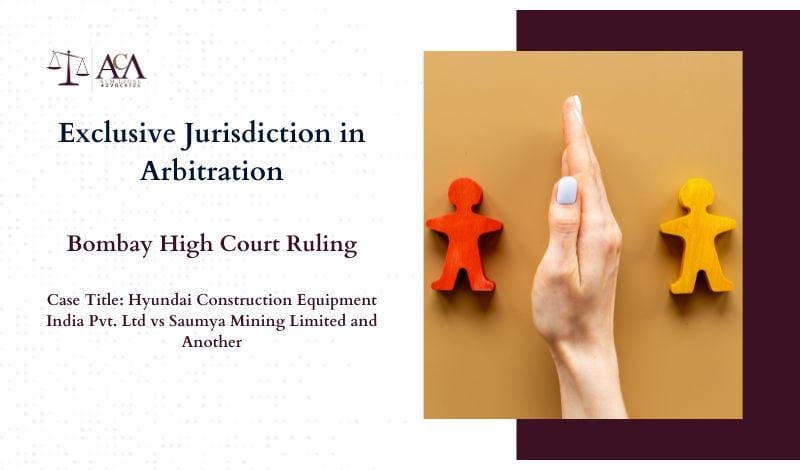Clarifying Exclusive Supervisory Jurisdiction in Arbitration: Bombay High Court’s Decision in Hyundai Construction Equipment India Pvt. Ltd vs Saumya Mining Limited
In the significant judgement of Hyundai Construction Equipment India Pvt. Ltd vs. Saumya Mining Limited, delineated under Arbitration Petition No. 32 of 2022, the Bombay High Court, under the bench of Justice Neela Gokhale, explained the exclusive supervisory jurisdiction within the context of the Arbitration and Conciliation Act, 1996.
This ruling highlighted that when an application related to an arbitration agreement is filed in a Court, that very Court is vested with the exclusive authority to manage any subsequent applications for the appointment of an Arbitrator under Section 11 of the Act. The judgement underscores the Court’s intention to mitigate jurisdictional overlaps and ensure a streamlined process for arbitration proceedings, thereby fostering judicial efficiency and ensuring that arbitration remains a swift dispute resolution mechanism.
Facts of the Case
The dispute between Hyundai Construction Equipment India Pvt. Ltd vs. Saumya Mining Limited (Arbitration Petition No. 32 of 2022) is anchored in two distinct agreements, detailed with specific clauses for arbitration. The initial agreement, dated October 1, 2011, necessitated Hyundai to supply designated equipment to Saumya, including a clause (Clause 25) for resolving disputes via arbitration in Kolkata under the 1996 Arbitration Act. Conversely, the subsequent agreement on September 26, 2013, involved leasing equipment to Saumya under an ‘Agreement of Sale in Installment,’ integrating another arbitration clause (Clause 31) that pointed to the 1940 Arbitration Act for dispute resolution, this time with Pune as the proposed venue.
The emergence of disputes prompted Hyundai to issue a demand notice to Saumya in October 2015. The lack of response from Saumya led Hyundai to initiate Arbitration Petition No. 265 of 2016 in the Kolkata High Court, which subsequently appointed a Court Receiver for the machinery’s possession. However, Saumya Mining relocated the machinery and necessitated an extension for the Court Receiver’s task. In a further development on April 16, 2019, Hyundai invoked the arbitration clause, nominating arbitrators and urging Saumya to nominate theirs, to which Saumya responded on May 27, 2019, by denying Hyundai’s claims and contesting the timeliness of the action. This series of events culminated in Hyundai filing a petition under Section 11 of the Arbitration Act in the Bombay High Court for the appointment of an Arbitrator, asserting the jurisdiction of the High Court based on the arbitration venue specified in the 2013 agreement as Pune, despite both agreements’ execution in Kolkata.
Observations by the High Court
The Court emphasized the principle of exclusive supervisory jurisdiction and noted that the petitioner had previously approached the Kolkata High Court for the appointment of a Court Receiver, thereby invoking the jurisdiction of the Kolkata High Court for matters related to the arbitration agreement. This action was rooted in the disputes that arose from the agreements executed in Kolkata, which also formed the basis of the cause of action.
Justice Gokhale emphasized the applicability of Section 42 of the Arbitration and Conciliation Act, 1996, which stipulates that once a Court is approached with respect to an arbitration agreement, it alone shall retain jurisdiction over the arbitral proceedings and all subsequent related applications. This provision aims to avoid conflicts in jurisdiction among courts by centralizing the supervisory jurisdiction of arbitration proceedings within a single court.
The judgement referenced the Supreme Court’s decision in BGS SGS Soma vs. NHPC Limited, which clarified that the Court first approached concerning part of the cause of action arising out of the arbitration agreement would hold exclusive jurisdiction under Section 42 of the Act. The judgement underlined the principle designed to ensure judicial efficiency by preventing jurisdictional conflicts and consolidating arbitration-related matters within one court.
The Bombay High Court concluded that the petition filed by Hyundai Construction Equipment India Pvt. Ltd for the appointment of an arbitrator was misconceived and without merit, as the Kolkata High Court had already been approached and had jurisdiction over the matter. This decision underscored the significance of the “seat” of arbitration in determining jurisdiction, noting that unless a specific seat is agreed upon or determined, multiple courts could potentially have jurisdiction based on where parts of the cause of action arise.
In light of these observations, the Court dismissed the arbitration petition filed in the Bombay High Court, affirming the exclusive jurisdiction of the Kolkata High Court over the arbitration proceedings between Hyundai Construction Equipment India Pvt. Ltd and Saumya Mining Limited, thereby upholding the principles of judicial propriety and the intent of the Arbitration and Conciliation Act, 1996.
This principle, aimed at curbing jurisdictional disputes, further supports the Supreme Court’s directive for consolidating arbitration-related matters within a singular jurisdiction. Through this judgement, the Bombay High Court has significantly impacted the landscape of territorial jurisdiction in arbitration matters, reinforcing the notion that the designation of a seat, even by default through the filing of the first application, is pivotal in determining the supervisory jurisdiction for arbitration proceedings.
Conclusion
The Bombay High Court’s ruling clarifies the application of exclusive supervisory jurisdiction in arbitration proceedings under the Arbitration and Conciliation Act, 1996. By affirming that the court first approached in relation to an arbitration agreement holds precedence in jurisdiction over subsequent applications, the judgement underscores the importance of judicial efficiency and the minimization of jurisdictional conflicts. This decision not only reinforces the central tenet of arbitration as a swift and efficient mechanism for dispute resolution but also highlights the critical role of the arbitration agreement’s “seat” in determining jurisdiction. This ruling thus serves as a pivotal guide for both legal practitioners and parties involved in arbitration, emphasizing the strategic consideration of jurisdictional aspects when drafting arbitration clauses and agreements.
Case Title: Hyundai Construction Equipment India Pvt. Ltd vs Saumya Mining Limited and Another
Case No: Arbitration Petition No. 32 of 2022.






